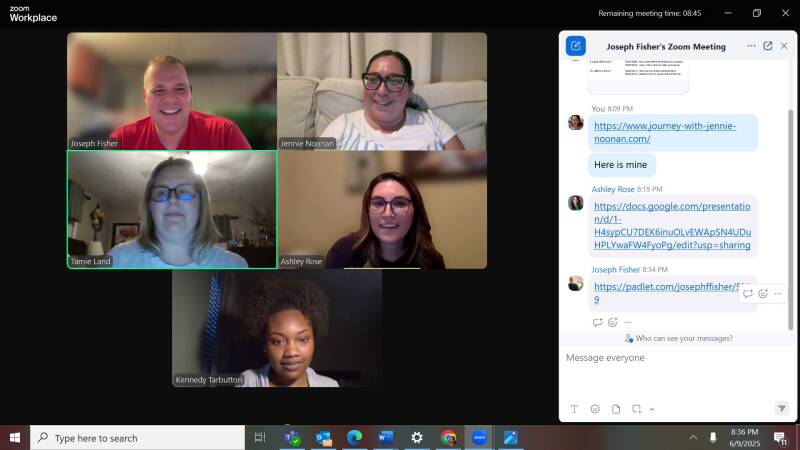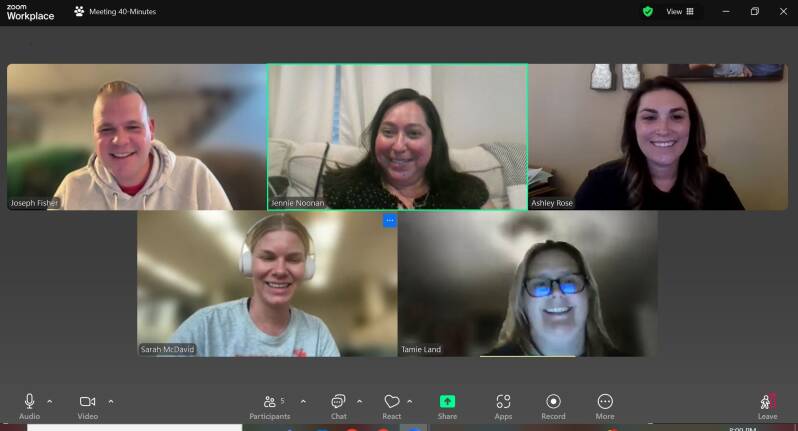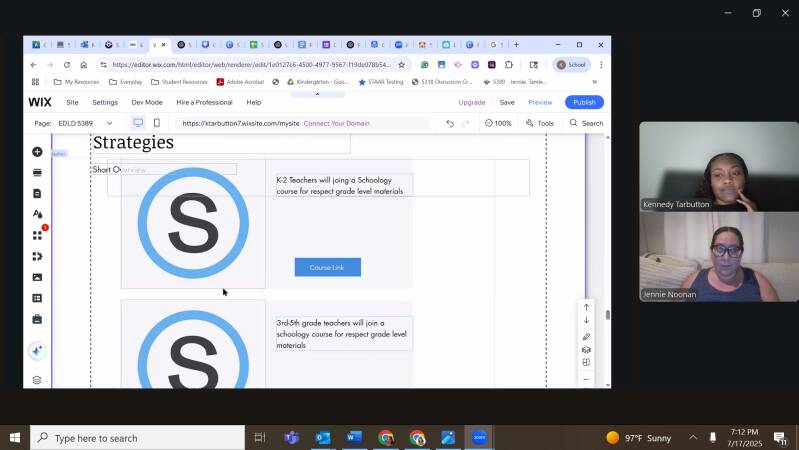Contribution to My Learning and the Learning Community
At the conclusion of EDLD 5389, I am awarding myself a score of 97/100 for my contributions to both my own learning and to our learning community. This course pushed me to not only deepen my understanding of effective professional learning but also engage meaningfully with my colleagues in ways that elevated all of our work.
My Self-Assessment: 97/100
I met all of the key contributions listed in the rubric, including:
-
Contributing to and helping build our core collaboration group.
-
Providing thoughtful, actionable peer feedback to my group members on each major assignment.
-
Revising my own assignments based on peer and instructor feedback, and reflecting on those revisions in this contribution activity.
-
Completing all course readings, videos, and supporting resources to inform and strengthen my work.
-
Meeting course activity deadlines as outlined in the calendar.
In addition, I demonstrated several supporting contributions:
-
I consistently took leadership responsibility within my base group by suggesting the use of Padlet to organize our feedback and collaborating with group members to create and maintain it.
-
I actively contributed to all group activities, including weekly Zoom meetings where we discussed challenges and refined our ideas, and daily conversations through our small GroupMe chat, which helped keep everyone aligned and supported.
-
I fully engaged with the required readings, videos, and supplemental resources throughout the course, which helped me contribute well-informed insights to discussions and feedback sessions.
-
I participated in the larger course discussions and forums as well, though I recognize that I could have responded to some posts earlier in the course. In the future, I plan to distribute my feedback more evenly between the broader course forum and my immediate cohort.
Group Members
I collaborated consistently with the following group members:
-
Ashley Rose
-
Sarah McDavid
-
Tamie Land
-
Joey Fisher
-
Kennedy Tarbutton
We communicated on discussions and assignments using Padlet where we shared feedback and tracked progress on our work. We also met often after the class Zoom meetings and maintained regular communication in our small GroupMe cohort. This tight-knit, intentional collaboration was unique to this course. While I have experienced community learning in prior courses, this is the first time I truly felt our group leveraged the opportunity to its fullest potential. Our consistent, real-time collaboration and feedback loop created a meaningful sense of accountability and growth, which directly improved the quality of my work.
Reflection
One area for growth is that I could have engaged sooner in some of the broader discussion forums. Although I ultimately responded to each collaborative discussion and replied to at least three peers per discussion post, I prioritized providing current and timely feedback to my small group first. This ensured their work had actionable and constructive input each week, and it allowed me to track their progress and growth throughout the course. However, moving forward, I plan to engage earlier in the larger class forums sooner in order to help foster a stronger sense of connection with the full learning community.
Attending every live Zoom session also strengthened my engagement and helped me stay on top of expectations. It allowed me to contribute meaningfully in real time, ask clarifying questions, and support others during these sessions. I believe my consistent presence, commitment to the readings and videos, and constructive feedback helped sustain the momentum my own learning thus contributing to our groups overall learning. I felt that I was seen as a reliable and supportive peer throughout the course.
Overall, I am proud of the contributions I made to my own learning and to the learning of others. As Fink (2013) reminds us, “At some point, to be powerful performers in life as well as self-directed learners, students must learn how to assess the quality of their own work” (p. 103). This reflection has pushed me to honestly evaluate how I showed up for myself and for my group, recognizing both strengths and areas for improvement. I not only grew as a self-directed learner but also helped create an environment of trust, feedback, and collaboration. These experiences will inform my professional practice, particularly as I work to foster similar learning communities among teachers in my school.
Links to My Work
You can view all of my work for this course at the links below, including the final compilation page as well as the key assignments that contributed to its development. These artifacts demonstrate my growth as a self-directed learner and my contributions to the learning community throughout this course.
References:
Canadian Education Association. (2015). Innovation that sticks: A case study of the Ottawa Catholic School Board. EdCan. https://www.edcan.ca/wp-content/uploads/cea_ocsb_innovation_report.pdf
Duarte, N. (2013). Resonate: Present visual stories that transform audiences. John Wiley
& Sons. http://resonate.duarte.com/#!page0
Fink, L. D. (2013). Creating significant learning experiences: An integrated approach to designing college courses. Jossey-Bass.
Goodwin, B. (2015). Research says/Does teacher collaboration promote teacher growth?
Educational Leadership, 73(4), 82–83. http://www.ascd.org/publications/educational-
leadership/dec15/vol73/num04/Does-Teacher-Collaboration-Promote-Teacher-
Growth%C2%A2.aspx
Gulamhussein, A. (2013). Teaching the teachers: Effective professional development in an era of high stakes accountability. Center for Public Education. https://web.archive.org/web/20180619070816/http://www.centerforpubliceducation.org/system/files/Professional%20Development.pdf
Harapnuik. D. (2016). Why you need a BHAG to design learning environments. It’s About Learning. https://www.harapnuik.org/?p=6414
Harapnuik. D. (2018). COVA. It’s About Learning. https://www.harapnuik.org/?page_id=6991
Harapnuik. D. (2019). Competency-based vs Outcomes-based education. It’s About Learning. https://www.harapnuik.org/?p=7889
Harapnuik. D. (2020). Why I don’t use checklists, progress bars & other activity monitors. It’s About Learning. https://www.harapnuik.org/?p=8314
Harapnuik. D. (2024). EdTech Tips. It’s About Learning. https://www.harapnuik.org/?page_id=9165
Hill, H. (2015). Review of The Mirage: Confronting the hard truth about our quest for teacher development. Great Lakes Center for Education Research & Practice. http://www.greatlakescenter.org/docs/Think_Twice/TT-Hill-TNTP.pdf
Learning Forward. (2019). Standards for professional learning: Quick reference guide. https://learningforward.org/wp-content/uploads/2019/09/standards-reference-guide.pdf
Reynolds, G. (2014). Presentation zen: Simple ideas on presentation design and delivery (2nd ed.). New Riders.
TEDx Talks. (2013, September). Empowering the teacher technophobe | Kristin Daniels | TEDxBurnsvilleED [Video]. YouTube. https://www.youtube.com/watch?v=puiNcIFJTCU
The New Teacher Project. (2015). The mirage: Confronting the hard truth about our quest for teacher development. TNTP. https://tntp.org/publications/view/the-mirage-confronting-the-truth-about-our-quest-for-teacher-development
Wei, R. C., Darling-Hammond, L., Andree, A., Richardson, N., & Orphanos, S. (2009). Professional learning in the learning profession: A status report on teacher development in the U.S. and abroad. National Staff Development Council. https://learningforward.org/report/status-professional-learning-2/phase-professional-learning-learning-profession/
Acknowledgments: Special thanks to Ms. Lucy McCoy for providing the PD schedule framework and supporting images.
"We do not learn from experience… we learn from reflecting on experience."
— John Dewey








Create Your Own Website With Webador